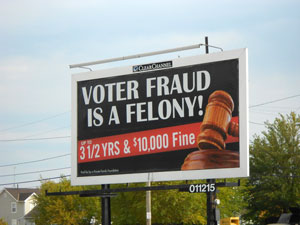BY LINDA BENTLEY | APRIL 9, 2014
Arizona’s uncontested early voting laws
‘It is clear to this court that the framers … intended to refer to the date that all qualified voters could appear at the polls to cast their ballots’
 .
.PHOENIX – Although only 28 states participated in the cross check part of the audit by the North Carolina Elections Oversight Committee, it uncovered 155,692 registered voters also registered to vote in other states, of which 35,750 appear to have voted both in North Carolina and in another state during the November 2012 election.
The audit also revealed 13,416 deceased voters still on the voter registration rolls, 81 of which have been voting from the grave.
The problem could be much broader in light of the fact data was missing from the other 22 states.
Considering Obama carried North Carolina by less than 15,000 votes, voter fraud, dead voters and double voting can definitely alter the outcome of elections.
Early voting provides more opportunities for double voting, especially in states such as Arizona, where early voting goes on for up to four weeks prior to the actual election date with a permanent early voting mail ballot.
Sonoran News first looked at the constitutionality of early voting back in 2006 when Maryland Circuit Court Judge Ronald A. Silkworth struck down an early voting law, citing, “… the General Assembly exceeded its constitutional authority in enacting the early voting statutes.”
Article XV, Section 7 of Maryland Constitution states, “All general elections in this state shall be held on the Tuesday next after the first Monday of November, in the year in which they shall occur.”
Stating the clear and unambiguous language of the Maryland Constitution that elections are to be held on a single day, Silkworth wrote, “To suggest that the framers intended that the entire election process would be concluded on the ‘Tuesday next after the first Monday in the month of November’ ignores the historical reality. Even in today’s world with automobiles, trains, planes, and computers, this cannot be done in most instances. Certainly, in the days of the horse and buggy, it could not be done. So, it is clear to this court that the framers, by setting forth the date of the election, intended to refer to the date that all qualified voters could appear at the polls to cast their ballots.”
Although never challenged, Article 7, Section 11 of the Arizona Constitution similarly provides: “There shall be a general election of representatives in Congress, and of state, county, and precinct officers on the first Tuesday after the first Monday in November of the first even numbered year after the year in which Arizona is admitted to statehood and biennially thereafter.”
With voting allowed for a full four weeks prior to that set election date, it would appear multi-state, double voting could be easily achieved.
Although never challenged in court, it appears Arizona’s early voting laws remain unconstitutional, while creating opportunities for voter fraud and double voting.
And, while voter fraud is a crime, it often goes unpunished.
Some people may recall Melowese Richardson, the poll worker from Madisonville, Ohio, who admitted to voting numerous times for Obama and sentenced to five years in prison for voting illegally on behalf of others, was released last month, after spending less than a year behind bars.



